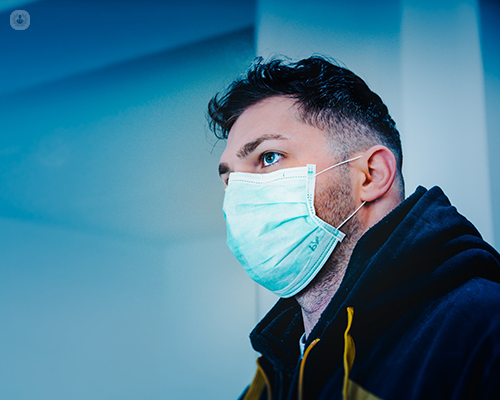Kidney stone care and COVID-19: consultations, emergency help and surgical procedures
Autore:Are you worried about kidney stone care during COVID-19 and don’t know what steps to take? Mr Andrew Ballaro, a senior consultant urologist and specialist in kidney and ureteric stones, has been helping patients with stones throughout the pandemic. Learn from him about what to do if you have kidney stone symptoms and the steps you can take. He also explains the measures being taken to ensure patient safety and provides details for contacting him in emergency and non-emergency situations.

I think I have kidney stones, what should I do?
The recommended steps to take depend on your symptoms. There are two sets of symptoms, both involving the loin, which is the side area of your back, below the ribs and above the buttocks.
- You might get acute (sudden) and very painful renal colic symptoms, this is very severe pain in the side and loin radiating to the groin, causing you to toss and turn unable to get into a comfortable position. This pain is caused by a stone getting stuck in the ureter (ureteric stone) which is the thin muscular tube draining urine from the kidney to the bladder.
- You might also get a dull, chronic left-sided pain in the loin, from a large stone in the kidney.
Steps for acute (sudden) pain
If you have acute severe pain that you think might be a kidney stone, it is reasonable to take an anti-inflammatory tablet such as ibuprofen, provided there are no contra-indications to do this e.g. if you have a gastric (stomach) ulcer, allergies or hypertension (high blood pressure). Anti-inflammatory tablets are very good at controlling the pain but, even with the COVID situation, you should go to an A&E department or a private emergency department to be assessed and have a kidney stone CT scan if indicated.
(If at any point you have an emergency situation, Mr Ballaro is available for emergency help at his hospital clinics – see end of article for contact details)
Steps for chronic pain
If you know you have stones in the kidneys and it’s causing chronic pain, you should consult with your urologist and arrange an online video consultation to discuss having a scan to determine if the stones have become larger and are causing a blockage.
What treatment is available?
Treatment for small stones in the ureter
It may be that the stone is small and your pain is controlled. If this is the case, the stone can be left to pass through the body on its own, however it is important that the stone passage is monitored with regular consultations and imaging. Surgical intervention may be required if the stone does not pass over a short period as long term obstruction of the urine drainage may cause kidney damage.
Treatment for large ureteric stones
Sometimes, stones are too big to pass on their own and need surgical intervention. This is still available in the current COVID situation.
We use a variety of operations to treat kidney stones with the type of operation usually being determined by the size and position of the stones and the patient's requirements. During the COVID-19 pandemic, the availability of the more complex procedures may be affected by the fact that quite a lot of these operations are being outsourced.
The most common initial treatment for a ureteric stone would be the placing of a ureteral stent which allows the urine to bypass the stone. This will remove the pain and stabilise the acute situation but there still remains the problem of the stone and stent being inside the body. It’s important that the stent is not left in the ureter for too long as sometimes, this can form additional stones around it making it more complicated to remove. If a stent is placed a second operation to break up and remove the stone with a laser is usually required.
Quite often, if the appropriate expertise and equipment are available, it is possible to remove the ureteric stone and not leave a stent at all, with one operation.
Waiting lists for surgery
When it comes to surgery for kidney stones in most NHS hospitals, the emergency situation is turned into an elective problem with the placement of a stent and the patient is then placed on an elective waiting list. Kidney stone operations often have a backlog anyway, but at many hospitals, the wait for definitive surgery has been considerably lengthened by the COVID situation, with resources being directed towards treating COVID-19 patients and delayed cancer patients.
Operations for larger stones in the kidney causing dull pain are deemed less urgent so you may find the wait for surgery increases due to the COVID situation.
If you’d like to know more about this, I’m available for video consultations (e-Consultation) to discuss your options and to answer any other concerns you may have.
How are hospitals set up to protect patients?
Patients will have full tests (including tests for COVID-19) before having treatment. They must self- isolate before treatment: all hospitals have specified that patients need to self-isolate for 14 days before their operation. However, this will be assessed on an individual basis when it comes to acute (emergency) medical intervention. For example, if a patient urgently needs a ureteral stent so that their urine can bypass a stone (but they haven’t isolated), a review would be taken.
Hospitals have made widespread changes. There are now different pathways based on the risks of patients having COVID-19. This is very closely monitored and used to keep infected and non-infected patients far from each other. These pathways are set up in both the public and private health sectors and will be in place for the foreseeable future.
Full PPE (personal protective equipment) is being worn by both doctors and patients. Furthermore, patients are screened for their temperature and asked to enter a questionnaire before entering hospitals.
Every method available that ensures patients and doctors aren’t unknowingly spreading the virus is being taken and this will continue for the foreseeable future - in both the public and private sectors.
Video consultations: leading professional advice from home
One of the biggest changes and most useful methods of preventing the virus’ spread has been the amazing increase of online video consultations between medical specialists and patients. Before COVID, we didn’t do video consultations but now we’re doing most of our consultations online.
New and existing patients can contact me through e-Consultation. The benefit of e-Consultation (by Top Doctors) is that it’s secure, encrypted and created with medical consultations at the heart of it, unlike Zoom and Skype which can pose privacy risks and weren’t designed as a tool for patients and doctors. I’ll be able to advise you via e-Consultation and, if it’s agreed that you need a face-to-face consultation e.g. a physical examination, you’ll be invited to the clinic and all the previously mentioned safety measures will be taken. Face to face consultations at some private hospitals (eg the hospital of St John and St Elizabeth) are still possible.
Emergency situations: If a video consultation isn’t an option because you have an emergency (e.g. sudden severe pain and renal colic), you can contact my PA directly: Tel. 0207 042 1790 or myself at [email protected]
If you have concerns about kidney stone symptoms and treatment, don’t hesitate to speak with Mr Ballaro. Get his leading professional advice from the safety of your own home via e-Consultation, our secure and encrypted video call service – visit his profile to get started.


